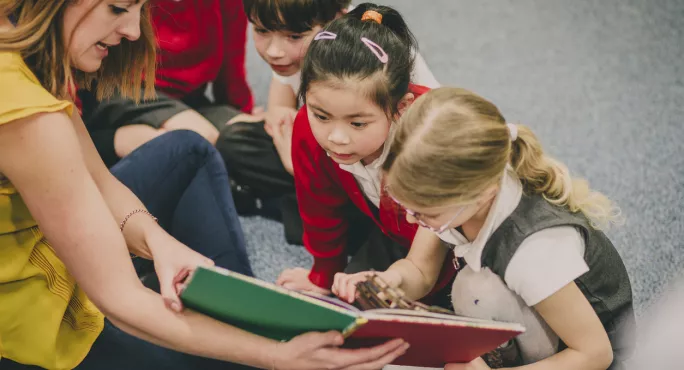- Home
- ‘Phonics put my granddaughter off reading for years’
‘Phonics put my granddaughter off reading for years’

My granddaughter lives in a bungalow, but for three years her school forced her to live in a horse.
“I live in a house,” says the book.
One child reads, “I live in a horse.”
Another child reads, “I live in a bungalow.”
Who is the better reader?
When my granddaughter started school at four, she had tremendous book knowledge. In other words, her parents had read to her and she’d looked at and listened to books from a very young age.
She also had an exceptionally varied vocabulary. Now, I know that all parents and grandparents think their children are brilliant, so let me give you an example.
The wheels on the bus rotate
I remember my granddaughter at about 18 months had all the intonations of speech, and would hold a conversation with the correct mannerisms and expressions, but without words. By 22 months, she was speaking clearly in proper sentences. When her great-grandfather visited, he said to her: “It goes round and round.”
She replied: “You mean it rotates, Great Granddad.” He nearly fell off his chair.
But, when this child started school, more than two years later, she was subjected to phonics and the Oxford Reading Tree. The school never tried any other method to encourage her.
She had no desire or reason to read the books she was given. Books that included sentences like, “The dog ran,” held no interest for her when she was listening to Charlie and the Chocolate Factory at home. She was never allowed even to choose a book.
‘I hate reading’
She very quickly became bored with the books and the phonics. It was a total mystery to her why she had to learn words that made no sense.
By the end of Reception, she would not read at home. She did not jump through the hoops that were expected. So Year 1 was more of the same, and she was making no progress with her reading.
I looked around for books that might interest her, but by the end of Year 1 she said to me: “I hate reading, Grandma.” As a teacher who felt a love of reading was vital, it broke my heart.
Year 2 continued in the same way, with no choice of book, phonics drilling and being made to sound out each word as she read. So she started with a book she had no interest to read, was made to sound out each word, had no comprehension of what she’d read and therefore lost all meaning or interest.
By the end of Year 2 the school felt there was a problem. Surprise, surprise!
Her parents asked me to step in and help. Firstly, I let her choose the book we read. Within two days, I realised she didn’t use phonics at all, and she knew most of the common words. She used context and meaning to read.
Nobody at school had picked that up, because all the tests related to phonics. She could pass the test, but didn’t use phonics in her reading.
Not jumping through hoops
I read with her for about eight days. She began to love reading and see herself as a reader, reading the books she liked. They were chapter books, such as How to Train Your Dragon. She wanted to read to everyone.
She still has a way to go yet, but reads every night to her parents. Even school has improved because, now she’s in Year 3, she’s allowed to choose her own reading book, within a colour band.
Unfortunately, she’s still not jumping through the hoops the school expects. So she is still on the same colour band, even though she’s read all of the books.
When are we going to learn that children are unique and do not fit into pre-set rules? Yes, we need phonics, but also whole word, context, meaning and analogy. My granddaughter uses analogy, and has been forced for three years to use a learning method that is alien to her.
I only hope my granddaughter has the resilience to recover from her first three years of schooling, which have managed to take away any belief she had in her own ability.
Do I blame the school? Or do I blame the government?
Whichever it is, we cannot go on failing so many children.
Annabel Hollis is a retired primary teacher and was formerly an early years adviser for Cheshire
Keep reading for just £1 per month
You've reached your limit of free articles this month. Subscribe for £1 per month for three months and get:
- Unlimited access to all Tes magazine content
- Exclusive subscriber-only stories
- Award-winning email newsletters